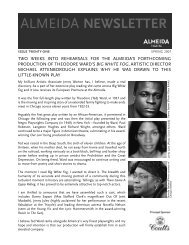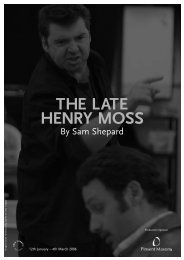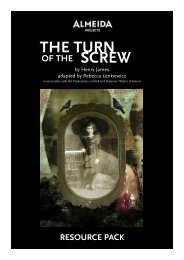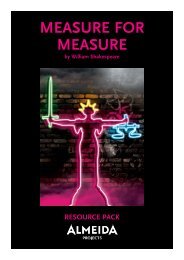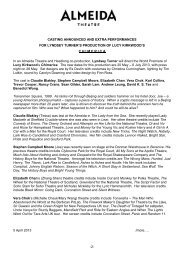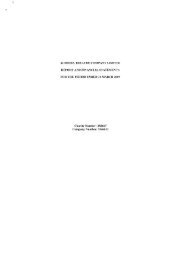The Last Days of Judas Iscariot - Almeida Theatre
The Last Days of Judas Iscariot - Almeida Theatre
The Last Days of Judas Iscariot - Almeida Theatre
Create successful ePaper yourself
Turn your PDF publications into a flip-book with our unique Google optimized e-Paper software.
Susan Lynch and Mark Lockyer<br />
Photo: Hugo Glendinning<br />
SUMMARY<br />
<strong>The</strong> <strong>Last</strong> <strong>Days</strong> <strong>of</strong> <strong>Judas</strong> <strong>Iscariot</strong> is a<br />
riotous courtroom drama, set in a corner<br />
<strong>of</strong> Purgatory called Hope (aka downtown<br />
New York City). <strong>The</strong> trial is between God<br />
and the Kingdom <strong>of</strong> Heaven and Earth<br />
versus <strong>Judas</strong> <strong>Iscariot</strong>. Fabiana Aziza<br />
Cunningham, the agnostic defence<br />
lawyer, obtains a writ from the God she<br />
isn’t sure she believes in, to force a<br />
retrial for <strong>Judas</strong>. Egyptian lawyer Yusef<br />
El-Fayoumy, up from Hell for the job,<br />
represents the prosecution. Various<br />
people are called to testify, from experts<br />
such as Mother <strong>The</strong>resa and Sigmund<br />
Freud, and direct witnesses including<br />
Simon the Zealot and Pontius Pilate, to<br />
Satan himself. Meanwhile <strong>Judas</strong> sits<br />
catatonic in a room in the ninth circle <strong>of</strong><br />
Hell, uncommunicative since his death,<br />
attended only – we later discover – by<br />
Jesus Christ.<br />
<strong>The</strong> play considers the conflict between<br />
divine mercy and human free will. If God<br />
is truly all-forgiving, why was <strong>Judas</strong> condemned<br />
to Hell for his betrayal <strong>of</strong> Jesus<br />
Christ and his subsequent suicide<br />
Act 1<br />
<strong>The</strong> play opens with a woman “emerging from the past”. She is the<br />
mother <strong>of</strong> <strong>Judas</strong> <strong>Iscariot</strong> who shares with the audience her grief at the<br />
death and lonely burial <strong>of</strong> her son <strong>Judas</strong>. She explains that she believes<br />
her son cannot be in hell, for if he is in hell then there is no God.<br />
We move to a courtroom in a corner <strong>of</strong> downtown purgatory called<br />
Hope. We meet Gloria, a woman who has acquired wings by working<br />
in Hope for two years. She describes flying back to earth to watch her<br />
family. She explains that the nature <strong>of</strong> Hope as a place has changed<br />
over the centuries and that in 2008 it is a courtroom where the souls<br />
are judged. Judge Littlefield dismisses case after case put before him<br />
including the case <strong>of</strong> God and the Kingdom <strong>of</strong> Heaven and Earth<br />
versus <strong>Judas</strong> <strong>Iscariot</strong>, submitted by a female Irish lawyer, Fabiana Aziza<br />
Cunningham, who has a writ signed by Saint Peter.<br />
Saint Monica appears in the court and explains that she has been<br />
enlisted by Cunningham to petition God on behalf <strong>of</strong> <strong>Judas</strong>. She both<br />
describes and re-enacts her visit to <strong>Judas</strong> and her attempts to goad<br />
him into defending his betrayal. In the re-enactment, <strong>Judas</strong> remains<br />
totally impassive and she sits with him for three days until she sees a<br />
single red tear fall from his eye. She explains how she looked into his<br />
eyes and detected a great sadness and held him in her arms for a<br />
further four days. On the fourth day he lets fall another single tear, and<br />
she decides that she has seen enough to petition to God on his behalf.<br />
St Monica describes leaving him her outer garments so he could smell<br />
something human and she also collected her own tears in a bucket<br />
and poured them over his face so that he could taste the salt.<br />
<strong>The</strong> Judge is still unwilling to try the case despite the eagerness <strong>of</strong><br />
Cunningham to defend it and El-Fayoumy to prosecute. <strong>The</strong> Judge<br />
doesn’t feel <strong>Judas</strong> is worthy <strong>of</strong> defence due to his betrayal and because<br />
he has not signed the writ himself. Cunningham eventually cites that<br />
the judge has been in Purgatory since 1864 when he took his own life<br />
on a battlefield in Georgia, and that the truths <strong>of</strong> his own case and that<br />
Plot Summary<br />
<strong>Almeida</strong> Projects: <strong>The</strong> <strong>Last</strong> <strong>Days</strong> <strong>of</strong> <strong>Judas</strong> <strong>Iscariot</strong> by Stephen Adly Guirgis<br />
5



